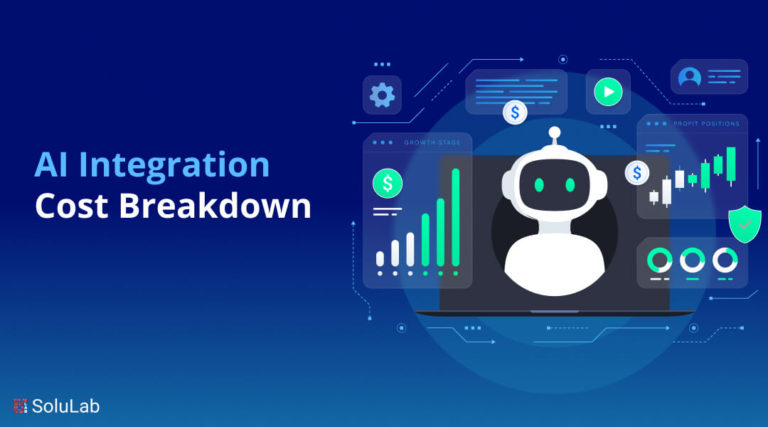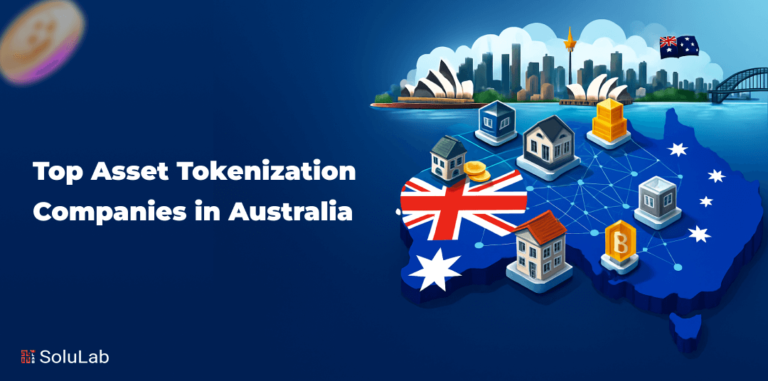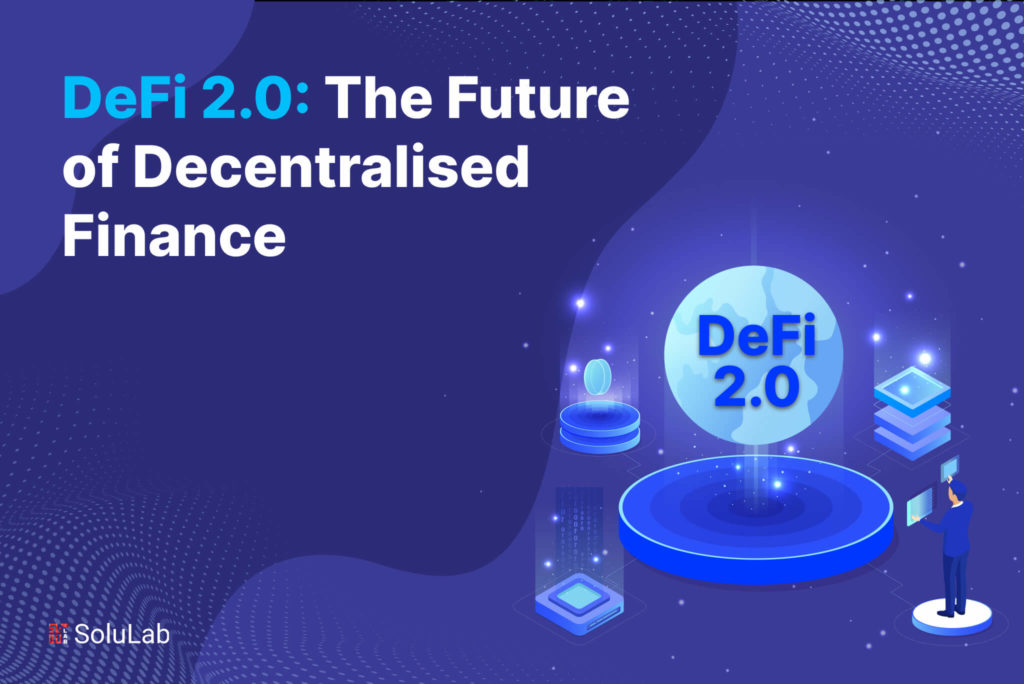
Decentralized Finance, often referred to as DeFi, is a revolutionary concept within the world of finance. It leverages blockchain technology to create an open and permissionless ecosystem that enables various financial services, such as lending, borrowing, trading, and more, without the need for traditional intermediaries like banks. DeFi is characterized by its transparency, accessibility, and automation, which have contributed to its rapid growth and popularity.
DeFi has continually evolved, giving rise to DeFi 2.0, the next phase of decentralized finance. DeFi 2.0 represents the maturation of the initial DeFi concepts and the integration of cutting-edge technologies and practices. It builds upon the foundation laid by DeFi by enhancing scalability, security, and interoperability, ultimately aiming to provide a more comprehensive and seamless financial experience.
In this evolution, DeFi 2.0 is driven by the latest DeFi trends, which are shaped by the innovative efforts of DeFi development companies. These top DeFi trends include improved user experience, the expansion of DeFi lending platforms, advancements in DeFi protocols, and the proliferation of decentralized applications (dApps). DeFi 2.0 is not limited to specific platforms but rather encompasses the entire DeFi ecosystem, the DeFi space, and DeFi exchanges.
What is the importance of DeFi 2.0 in the Financial Landscape?
The introduction of DeFi 2.0 marks a significant turning point in the financial landscape, where the world of decentralized finance (DeFi) transcends its initial boundaries and takes a giant leap forward. DeFi, often characterised as the innovation that decentralized traditional financial services, has been on a transformative journey, and it’s in DeFi 2.0 that we witness the convergence of numerous trends and developments.
As DeFi continues to evolve, it’s essential to recognize the key drivers and players in this space. DeFi development companies have played a pivotal role in shaping the top DeFi trends. These companies are at the forefront of research and innovation, continually pushing the boundaries of what DeFi can achieve. Their expertise and contribution to DeFi development service are instrumental in building the DeFi ecosystem.
One of the most notable aspects of DeFi 2.0 is the advancements in DeFi exchange development. Decentralized exchanges, the backbone of DeFi, have grown exponentially. They have enabled seamless and permissionless trading of digital assets while providing unprecedented liquidity. DeFi exchange development continues to refine these platforms, making them more efficient, secure, and user-friendly.
DeFi lending platforms are another integral part of the DeFi ecosystem. They offer decentralized, borderless, and transparent lending and borrowing solutions. DeFi 2.0 enhances these platforms by introducing more sophisticated and efficient protocols. These protocols are designed to mitigate risks and optimise lending processes, ultimately making DeFi lending more accessible and attractive to a broader audience.
What are the Emergence of DeFi 2.0 Within These Trends?
The emergence of DeFi 2.0 represents a significant evolutionary step within the ever-evolving landscape of decentralized finance. As DeFi has gained momentum and popularity in recent years, it has brought about a multitude of trends and developments. DeFi 2.0 builds upon these trends, propelling the ecosystem into new and uncharted territories.
One of the top DeFi trends that has led to the emergence of DeFi 2.0 is the growing involvement of DeFi development companies. These companies play a pivotal role in the ongoing development of the DeFi space, creating innovative solutions, and building the infrastructure required to support the DeFi ecosystem. DeFi development services offered by these companies encompass a wide array of functions, including smart contract development, blockchain integration, and protocol creation.
DeFi development companies are at the forefront of pioneering DeFi 2.0, as they continue to refine existing protocols and create new ones that address the limitations of the first-generation DeFi projects. The development of robust and secure DeFi protocols is crucial for the sustainability and growth of the DeFi ecosystem. These protocols underpin DeFi lending platforms, decentralized exchanges, and a variety of decentralized applications (dApps).
How DeFi Development Companies Shape Trends?
DeFi development companies are entities that specialise in creating, maintaining, and upgrading various aspects of the DeFi space. These companies offer a range of DeFi development services, including the development of DeFi protocols, DeFi exchange development, DeFi lending platforms, decentralized applications (dApps), and DeFi wallets. Their expertise and contributions have a significant impact on the development of the DeFi ecosystem.
-
DeFi Protocol Advancements
DeFi development companies are instrumental in designing and implementing new DeFi protocols. These protocols serve as the backbone of DeFi applications, enabling functionalities such as lending, borrowing, trading, and yield farming. By creating cutting-edge protocols, these companies set the stage for top DeFi trends.
-
DeFi Exchange Development
DeFi development companies are responsible for the creation of decentralized exchanges (DEXs), which are critical components of the DeFi space. They enhance the user experience, security, and functionality of DEXs, directly impacting how users interact with DeFi platforms.
-
DeFi Lending Platforms
DeFi development companies develop lending and borrowing platforms that facilitate peer-to-peer transactions. They influence the trends in the DeFi lending space by introducing innovative features and optimizing the lending experience.
-
DApps and DeFi Wallets
DeFi development companies contribute to the development of decentralized applications and DeFi wallets, ensuring they are user-friendly and secure. This shapes the way individuals access and use DeFi services.
What are the Services Offered by DeFi Development Companies?
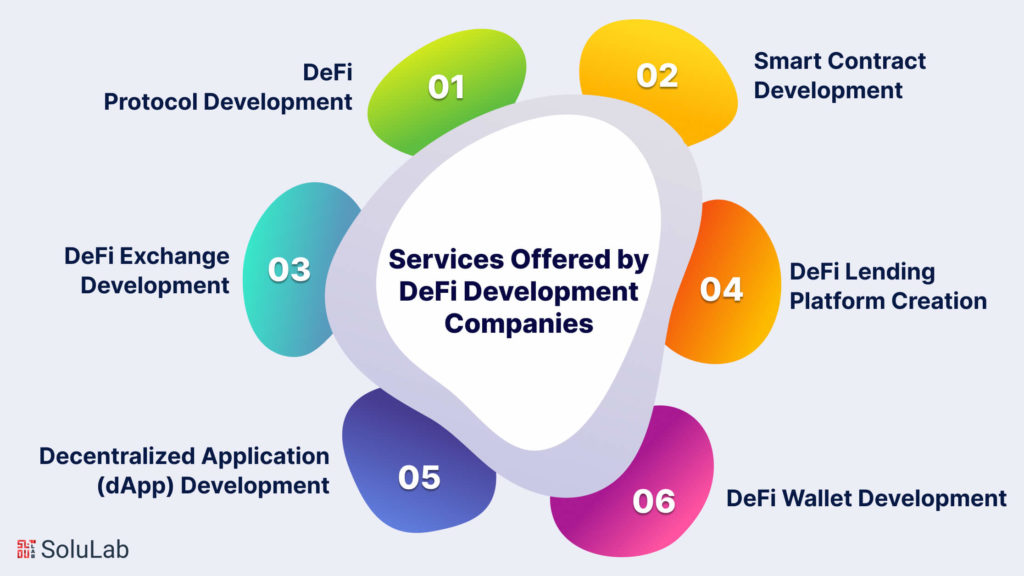
In the ever-evolving landscape of Decentralized Finance (DeFi) 2.0, DeFi development companies play a pivotal role in driving innovation and shaping the future of finance. These companies offer a diverse range of services, capitalising on the top DeFi trends to create cutting-edge solutions for the DeFi ecosystem. Let’s delve into the services provided by these key players in the DeFi development space.
-
DeFi Protocol Development
DeFi development companies specialise in creating and enhancing DeFi protocols, the backbone of the DeFi ecosystem. These protocols facilitate various financial activities, such as lending, borrowing, trading, and yield farming. They are constantly adapting to the latest DeFi trends, ensuring optimal performance and security.
-
Smart Contract Development
One of the core components of DeFi 2.0 is the use of smart contracts. DeFi development service providers are experts in designing and developing secure and efficient smart contracts, which underpin DeFi applications and platforms.
-
DeFi Exchange Development
DeFi exchanges are at the forefront of the DeFi space. DeFi development companies specialize in building decentralized exchange platforms that offer seamless trading experiences while integrating the latest DeFi trends, such as automated market makers (AMMs) and liquidity pools.
-
DeFi Lending Platform Creation
The lending and borrowing sector within the DeFi ecosystem has gained significant traction. DeFi development companies offer services to build and optimize DeFi lending platforms, allowing users to earn interest on their assets or access loans without intermediaries.
-
Decentralized Application (dApp) Development
DeFi dApps are instrumental in expanding the DeFi space. DeFi development companies design and develop user-friendly and secure dApps that cater to a wide range of financial needs, including asset management, yield farming, and more.
-
DeFi Wallet Development
Security and usability are paramount in the DeFi 2.0 landscape. DeFi development service providers focus on creating secure and user-friendly DeFi wallets that enable users to store, manage, and interact with their assets while staying updated with top DeFi trends.
What is the Significance of Decentralized Exchanges in DeFi 2.0?
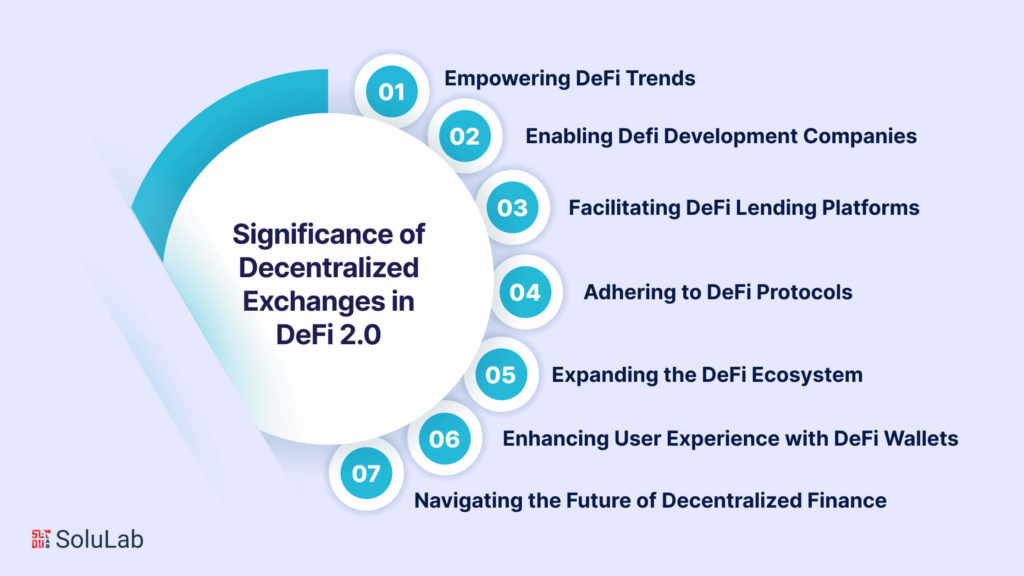
In the ever-evolving landscape of Decentralized Finance (DeFi) 2.0, decentralized exchanges (DeFi exchanges) play a pivotal role, embodying the cutting edge of this financial revolution. These exchanges are where digital assets are traded in a trustless, peer-to-peer manner, eliminating the need for intermediaries such as traditional banks and brokers. Let’s explore their significance in the context of DeFi 2.0 and their contributions to various aspects of the DeFi ecosystem.
-
Empowering DeFi Trends
Decentralized exchanges are at the forefront of the top DeFi trends, facilitating the trading of a wide range of assets, including cryptocurrencies, tokens, and even non-fungible tokens (NFTs). They provide liquidity and accessibility to these assets, thus contributing significantly to the DeFi space’s dynamism.
-
Enabling Defi Development Companies
DeFi development companies heavily rely on decentralized exchanges to create and launch DeFi projects. These exchanges offer the infrastructure and technology needed to build, test, and deploy DeFi protocols, lending platforms, and other decentralized applications.
-
Facilitating DeFi Lending Platforms
In the DeFi 2.0 ecosystem, lending and borrowing are essential services. Decentralized exchanges allow users to collateralize their assets, thus playing a critical role in DeFi lending platforms. This interaction between exchanges and lending platforms forms the core of DeFi’s decentralized financial services.
-
Adhering to DeFi Protocols
DeFi exchange development aligns with various DeFi protocols, ensuring interoperability and consistency within the ecosystem. Liquidity providers, yield farmers, and DeFi users benefit from this adherence, as it enables seamless transactions across multiple DeFi applications.
-
Expanding the DeFi Ecosystem
Decentralized exchanges are expanding the boundaries of the DeFi ecosystem. By listing new tokens and experimenting with innovative trading mechanisms, they drive the evolution of DeFi 2.0. This continuous innovation broadens the offerings and options available to DeFi participants.
-
Enhancing User Experience with DeFi Wallets
DeFi exchanges often integrate with DeFi wallets, providing users with a seamless experience. Wallets are instrumental in connecting users to decentralized applications (dApps), and the synergy between wallets and exchanges creates a user-friendly environment for interacting with the DeFi 2.0 landscape.
-
Navigating the Future of Decentralized Finance
As DeFi continues to evolve, the future of decentralized finance 2.0 relies heavily on the development and innovation within decentralized exchanges. Their adaptability, scalability, and security will determine the success and sustainability of DeFi in the broader financial ecosystem.
What are the Innovations in DeFi Wallet Innovations?
In the ever-evolving landscape of Decentralized Finance (DeFi), wallets play a pivotal role in shaping the future of the ecosystem. DeFi 2.0, the next phase of DeFi development, relies heavily on the functionality and security of these digital wallets. In this article, we explore the essential aspects of DeFi wallets, including their role, security, usability, and the innovations that are driving the space forward.
DeFi 2.0 has ushered in a wave of innovative wallet technologies, pushing the boundaries of what wallets can offer:
-
Interoperability
DeFi wallets are now built to seamlessly interact with various blockchain networks and DeFi protocols. This interoperability allows users to access a broader range of services and assets within a single wallet.
-
Delegated Access Control
Wallets are integrating more sophisticated access control mechanisms. Users can delegate access to specific functions or assets within their wallet while maintaining overall control. This feature is particularly valuable in the DeFi lending platform space.
-
Decentralized Identity
DeFi wallets are exploring the integration of decentralized identity solutions. This can enhance user privacy and security while ensuring a smoother user experience across DeFi applications.
-
Mobile Wallets
With the growth of mobile DeFi apps, mobile wallets are evolving rapidly. These wallets bring DeFi 2.0 to the fingertips of users, allowing them to manage their DeFi portfolios on the go.
What is the Potential Impact on Traditional Finance?
The evolution of DeFi 2.0 and the pivotal role of DeFi wallets have the potential to disrupt traditional finance in several ways:
-
Financial Inclusion
DeFi 2.0 can extend financial services to the unbanked and underbanked populations globally, reducing dependence on traditional financial institutions.
-
Reduced Intermediaries
Traditional financial intermediaries may see decreased relevance as DeFi wallets provide direct access to a wide range of financial services, from lending to trading.
-
Cross-Border Transactions
DeFi 2.0’s borderless nature can revolutionize cross-border transactions, rendering traditional remittance services obsolete.
What are the Challenges and Opportunities for DeFi 2.0?
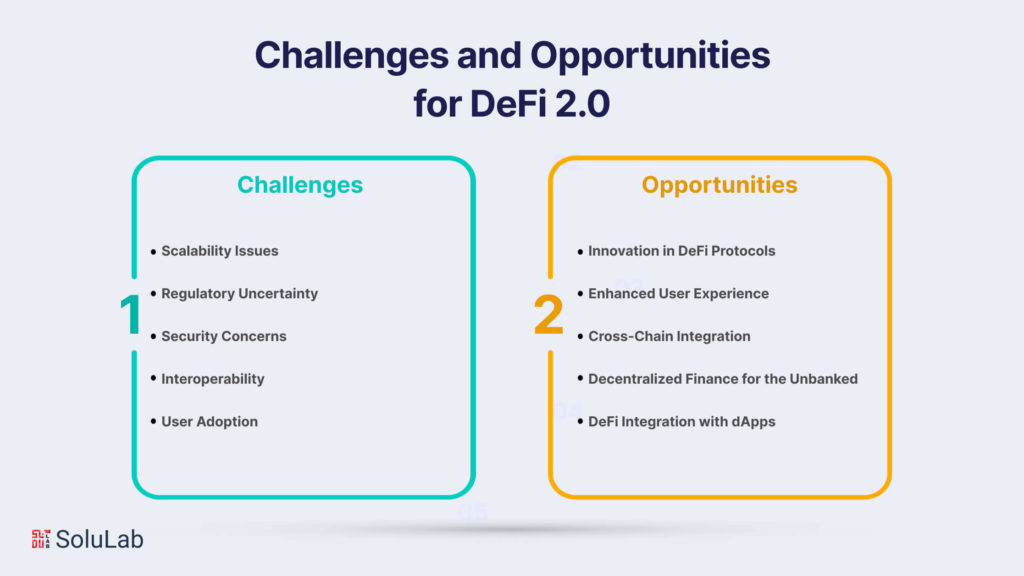
Challenges
-
Scalability Issues
DeFi 2.0 seeks to address the scalability challenges that plagued the first generation of DeFi platforms. As the ecosystem grows, it must overcome issues related to slow transaction processing and high gas fees.
-
Regulatory Uncertainty
The evolving regulatory landscape poses a significant challenge. DeFi 2.0 projects need to navigate complex legal frameworks and compliance requirements, which may vary by jurisdiction.
-
Security Concerns
Despite advancements in security protocols, DeFi remains vulnerable to hacks and exploits. DeFi 2.0 must prioritise security and resilience to protect users and assets.
-
Interoperability
Achieving interoperability among various DeFi platforms and protocols is essential. The challenge is to enable seamless integration between different projects to create a cohesive DeFi ecosystem.
-
User Adoption
While DeFi is gaining traction, mass adoption remains a challenge. DeFi 2.0 must focus on improving user experience and education to onboard mainstream users
Opportunities
-
Innovation in DeFi Protocols
DeFi 2.0 offers the opportunity to develop more robust and efficient protocols. These can enhance transaction speed and security, leading to a more resilient ecosystem.
-
Enhanced User Experience
DeFi 2.0 projects can prioritise user-friendly interfaces and streamlined processes, making it easier for non-technical users to participate.
-
Cross-Chain Integration
Bridging different blockchain networks can expand the DeFi space and unlock new opportunities for cross-chain trading and lending.
-
Decentralized Finance for the Unbanked
DeFi 2.0 can extend its reach to the unbanked and underbanked populations, providing financial services to those who have limited access to traditional banking.
-
DeFi Integration with dApps
The integration of DeFi with decentralized applications (dApps) can unlock a multitude of use cases, from gaming to social networking, providing more opportunities for DeFi to grow.
Conclusion
In a rapidly evolving landscape, SoluLab has established itself as a pioneering force in DeFi 2.0, contributing to the transformation of the decentralized finance (DeFi) ecosystem. The company’s expertise in DeFi development, including Defi lending platforms, Defi exchange development, and Defi protocols, positions them as a key player in shaping the future of Decentralized Finance 2.0.
As the top DeFi development service provider, SoluLab is at the forefront of the most significant DeFi trends, offering cutting-edge solutions for DeFi exchanges and decentralized applications (dApps). Their dedication to innovation and commitment to enhancing the security and user experience of DeFi wallets demonstrates their vision for a more robust and accessible DeFi space.
In an era where the DeFi landscape is continually evolving, SoluLab’s commitment to pushing the boundaries of DeFi 2.0 technology makes them a strategic partner for those seeking to navigate the ever-expanding and complex world of decentralized finance. SoluLab is undeniably contributing to the brighter and more inclusive future of Decentralized Finance 2.0.
FAQs
1. What is DeFi 2.0, and how does it differ from traditional DeFi?
DeFi 2.0 is an evolution of traditional DeFi, characterized by improved scalability and enhanced user experiences.
2. What are the top DeFi trends in the DeFi 2.0 ecosystem?
Top DeFi trends in DeFi 2.0 include cross-chain interoperability, optimized DeFi protocols, and enhanced DeFi wallets.
3. How is DeFi 2.0 reshaping the future of decentralized finance?
DeFi 2.0 is shaping the future by addressing the limitations of scalability, security, and usability present in traditional DeFi, making it more accessible and efficient.
4. What services do Defi development companies offer for DeFi 2.0 projects?
Defi development companies offer services such as DeFi protocol development, DeFi exchange development, DeFi wallet integration, and dApp creation for the DeFi 2.0 ecosystem.
5. What are DeFi lending platforms, and how do they fit into DeFi 2.0?
DeFi lending platforms are integral to DeFi 2.0, offering users the ability to lend, borrow, and earn interest on crypto assets in a more advanced and secure manner.




